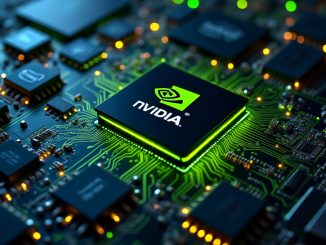
This week, all eyes are on Nvidia (NVDA) as it prepares to unveil its fiscal year 2025 third-quarter earnings late Wednesday. The expectations are sky-high, possibly the most intense the company has ever faced. The spotlight is on Nvidia not just for its financial results but for its strategic direction in the rapidly evolving AI landscape.
Nvidia has set a bold target for itself, forecasting a revenue of around $32.5 billion for the third quarter, with expected gross profit margins hovering around an impressive 75%. Such margins when you think about it are remarkable for a company of Nvidia’s size, underscoring the premium nature and market demand for its AI and graphics processing units (GPUs).
Analysts are not far behind in their predictions, setting a consensus for an earnings per share (EPS) of $0.74 and revenue expectations slightly above Nvidia’s own forecast at $32.94 billion. If Nvidia can match or surpass these figures, it would demonstrate not just growth but a substantial leap in performance compared to last year’s third quarter, where the company reported $18.12 billion in revenue with gross margins at 74%, a jump of approximately 38% from 53.6% in Q3/FY23. This would translate to a doubling of revenue and a modest increase in margins by about 80 basis points, affirming Nvidia’s dominant position in the tech sector.
A critical point of interest during this earnings call will be Nvidia’s guidance for future quarters, especially concerning the production and rollout of the Blackwell AI chips. These chips, pivotal for next-generation AI applications, were supposed to start shipping this quarter. However, a recent report from The Information highlighted overheating issues with the servers designed to house these chips, potentially delaying data center setups. Nvidia has been actively engaging with its suppliers to redesign server racks to mitigate these thermal challenges, though specifics on these suppliers were not disclosed.
In response to queries from Reuters about these delays, a Nvidia spokesperson emphasized collaboration with leading cloud service providers, suggesting these engineering adjustments are part of the normal development process.
It should be noted that situation, if not quickly resolved, might force Nvidia to make tough calls on product prioritization or even cancellations, reflecting the complexities of bringing high-tech innovations to market.
As Nvidia navigates through these challenges, the market remains eager to see how the company manages expectations, addresses technical hurdles, and continues to lead in AI technology. The outcome of this earnings report could very well set the tone for Nvidia’s direction in the AI race, where speed, efficiency, and reliability are not just features but critical components of success.
Price Action: Nvidia’s stock experienced a 3.8% drop last week, closing at $141.98, with the majority of the decline occurring on Friday. This could be attributed to a mix of anticipation and apprehension regarding the co.’s upcoming earnings.
- Bulenox: Get 45% to 91% OFF ... Use Discount Code: UNO
- Risk Our Money Not Yours | Get 50% to 90% OFF ... Use Discount Code: MMBVBKSM
Disclaimer: This page contains affiliate links. If you choose to make a purchase after clicking a link, we may receive a commission at no additional cost to you. Thank you for your support!




Leave a Reply